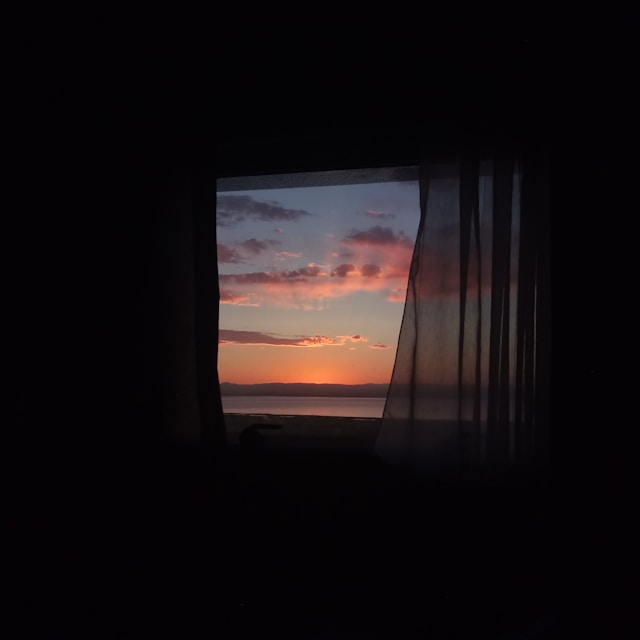
AFTER
He began a new life after his near-death experience. Part of him had died while another part went on living. A heart attack was a common event. But this was his reckoning, the moment when his life split into fragments. He was his own observer, as if he were watching from a distance as he tried to reassemble his personality. He looked for meaning and significance. Day by day, he was amused but charitable as he monitored the behavior of this stranger, this splinter of consciousness that insisted on staying alive. He would become a better person.
Life was the essential element. He believed in his future as a breathing being, a bleeding being, a seething being. His nerves had been shredded. He was under construction. He would be a new and improved, rebuilt version of his previous self, sleek and superior, moving at maximum velocity. Moving where?
He was on the road when his heart assaulted him. Car overturned. He woke up in a ditch. The drive home from the office had turned into the longest, most dangerous drive of his life. He entered new dimensions of strangeness. Doctors prodded him as if he were a squid or a jellyfish, a submerged creature brought to the surface to be inspected. They poked at him and made notes and compared the results to the previous day’s results. They charted his progress and examined X-rays. The MRI was frightening, as if he were shuttled into a separate universe beyond his understanding. Then he was sent home.
He quit his job. He was impulsive and careless. The impulses of a lifetime had spiraled out of control. He couldn’t endure the office. It was like an aquarium where strange bloated faces squinted at him through a blue-green haze.
He didn’t drive home after he quit his job. He rode the bus. The vehicle passed briefly along a neighborhood street. He noticed an address, 1970, the year he was born. The number at the end of the next block would be the year of his death. He closed his eyes. The bus moved ahead. At the corner there was an address, a number, 2021, which was next year.
When he arrived home, he expected to find the house ransacked, with chairs and tables overturned and closets empty. He anticipated outward signs of his inner turmoil. The house was intact. It was intact but not safe. There was no safety. In the living room he paused in front of the mantelpiece where the five diplomas were on display. Three belonged to Marie and two belonged to him. His diplomas were relics. They offered reassurance that he was in his own house, but nothing more than that. He could get lost. He was afraid of wandering away with his brain turned off and wandering through any open door in search of safety. When he was driving, he had wandered off the road as his heart sent out distress signals.
Marie was on the balcony. She turned toward him with a slow-motion movement that indicated apprehension. Behind her, in the distance, the city’s skyscrapers were like spikes against the sky, backlit by the sun.
Marie had a near-death experience when she was twenty-one. She had talked about this only once, in a bland, matter-of-fact way. But she knew what it was like to return from death. She took an overdose of barbiturates in a suicide attempt. She was worried, at the time, that she would flunk out of school. A small worry, he thought. Worse things could happen. Death was worse. Why? Because it was permanent. The return from death was significant. He wasn’t ready for so much significance. He wanted to live as he had always lived, with the same habits, rituals, and routines. That was inadequate now. He was too small for the emotions that crowded around him, the feelings that bubbled up from the depths, fathoms and fathoms of emotions.
All of this could be taken away in an instant. As he was pulled from his car when it was upside down in the ditch, he was unafraid. He had been rescued. A rescue was decisive. Now he should be safe for the rest of his life.
Fear could not be shared. He didn’t want Marie to feel the apprehension. Instant death, sudden death, was possible at any moment, an attack from within. He didn’t want Marie to feel it. He enjoyed walking with her along the neighborhood streets or the park. She was aware of colors and scents, the texture of the light, the way the air changed as the seasons changed.
A week from now, Marie would fly to Houston for a conference. He perceived danger. A fatal moment was possible during any trip away from home. His cardiac event had happened away from home. He was never safe when he went out the door. Marie was different. She expected to arrive at her destination without danger. He wanted to explain that any number of hazards was a factor in all departures. But he said nothing.
The light through the windows was changing. Dusk was happening. In the past, he had believed without evidence that most people died during the daytime. Night was more appropriate. You died and you were gathered into the darkness. You entered an alternate dimension, but its shapes and contours were unknown. The new dimension might be smooth or grainy, either blue-green or colorless. Possibly comforting. Too much was unknown.
Later, all through the night, he was unconscious for hours and hours in a miniature death punctuated by dreams. He woke up at sunrise. A few days ago, he was certain that he would not live to witness the start of another day. He was still alive. He woke up. The window was aflame. There it was, the sun, a living presence on the horizon.
END